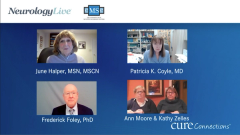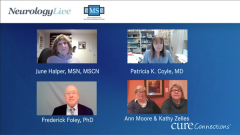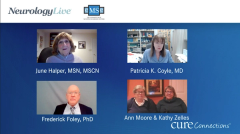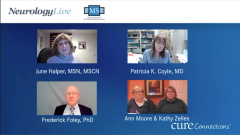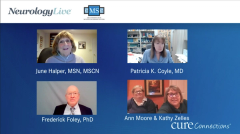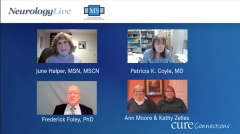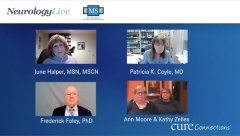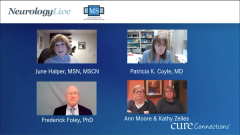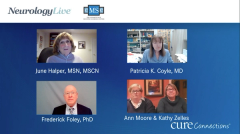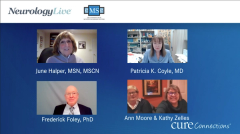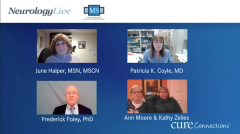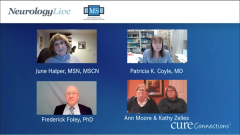
Final Thoughts: Improving QoL in Multiple Sclerosis

Episodes in this series

Final thoughts from participants on improving quality of life in patients with multiple sclerosis.
June Halper, MSN, MSCN: All in all, I think our discussion tonight really shows that there’s a huge amount of promise in MS Final Thoughts: Improving QoL in Multiple Sclerosisdue to disease-modifying therapies, as you said, the three different groups. But also it seems to me, and I guess having been in the field for a long time, knowing you, Dr. Coyle, knowing you, Dr. Foley, and of course, knowing you two people over there, Ann and Kathy, it seems to me that it’s more than just medications. It seems to me that education, that we need to use as much of a tool for each person as much as they can learn and understand, to be very sensitive to somebody’s background, ethno-culturally, people of color, people of different birth and background, that whatever you spoke about tonight was really individualized care.
As you just said it Dr. Coyle, I think we sort of missed it in our conversation, the whole wellness approach. I think MS [multiple sclerosis] is a disease of the central nervous system, but if you take good care of yourself, you can maintain your heart and your lungs, you can do all the things in your gender that you take care of and work as part of your team. I think to me that’s the most important thing to not have a physician or a clinician, such as Dr. Foley, say you must do this. You’ve got to participate. I think you have to understand, and you have to be involved in the process. We’re reaching the end of our visit. I’d like Dr. Foley to say some closing words, maybe some words of wisdom.
Frederick Foley, PhD: Well, from a psychological perspective, MS [multiple sclerosis] has presented many, many challenges to persons with MS and their families. Anxiety, depression, adjustment issues, uncertainty, misinterpretation of kind of changing behaviors in patients, all these things represent challenges. Fortunately, we know that many of these psychological challenges and even some of the cognitive problems that patients develop can be treated more successfully today than they could five years ago. We’re very optimistic that we will continue to be able to improve the quality of life for people with MS.
June Halper, MSN, MSCN: Ann and Kathy, thank you so much for sharing your story with us. Would you like to say one or two closing remarks to end our very?
Ann Moore: I would say is I would concur with what Dr. Coyle said earlier on. Get on therapy as quickly as you can. I mean, there wasn’t anything out when I was diagnosed but I waited a long time. I’m not saying it was bad, but if I had gotten on it earlier, that I would recommend. Talking often and regularly with your significant other and your close friends, and also, I would suggest seeking out support of people who are in the same boat as you. I go to an MS support group here in West Milford that meets once a month, and I think that’s very, very important to do.
June Halper, MSN, MSCN: Great. Kathy?
Kathy Zelles: Just to roll with the punches a little bit. Remember that flexibility is important, and the bottom line is you love each other, make sure you respect everything about the person. I know her really well, so I know when things are bumpy and when they’re not. When they’re not bumpy, do something fun. You have to laugh.
June Halper, MSN, MSCN: Absolutely, yeah. Dr. Coyle, thank you so much for spending this time with us and sharing your thoughts. Would you like to say some closing remarks and any words of wisdom before we adjourn?
Patricia K. Coyle, MD: Just from a neurological point of view, this is a new era. MS is the poster child for successful development of disease-modifying therapies. Make sure your diagnosis is proper, you’re going to a knowledgeable person, get on early treatment, follow that wellness program, treat comorbid conditions to promote CNS [central nervous system] health, to have the central nervous system age better, open communication. And remember, the bottom line is you want to be happy. If you’re not happy there is something wrong, and you have to fix something, and if you’re not happy in your relationship with your healthcare provider, that has to be fixed. You want to be happy. You should be happy. If you’re not happy there’s something wrong. Act on it.
June Halper, MSN, MSCN: Wow, powerful words. I think we have some very powerful messages we shared tonight. I want to thank you all for watching and joining us at this NeurologyLive® Cure Connections®. If you enjoyed this program, please subscribe to the e-newsletter to receive upcoming information about other programs. I’d like to thank you all for the time and I thank you all for this wonderful opportunity and hope to see you all again.
Newsletter
Keep your finger on the pulse of neurology—subscribe to NeurologyLive for expert interviews, new data, and breakthrough treatment updates.

